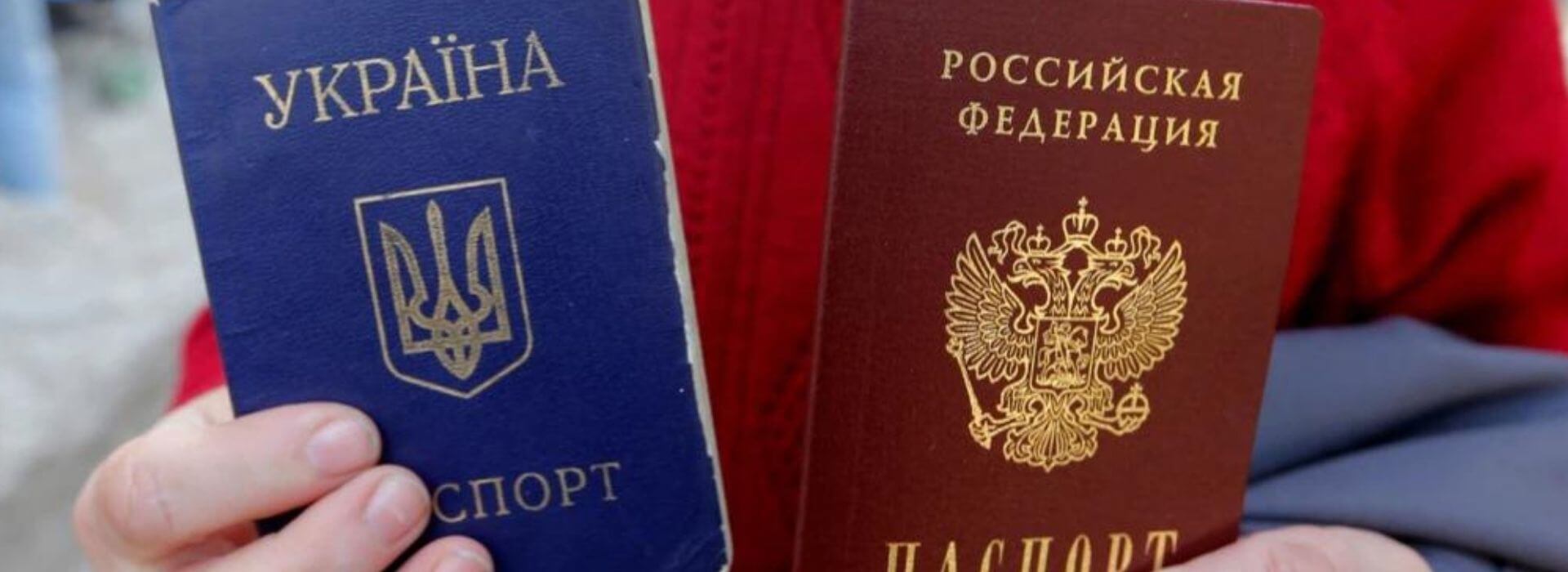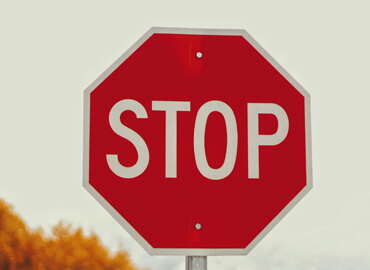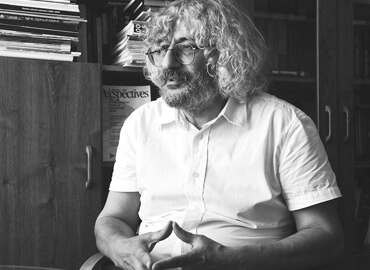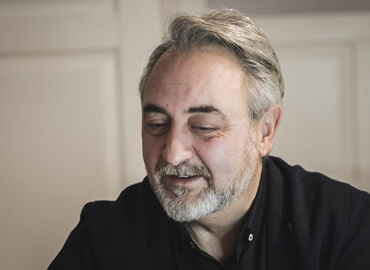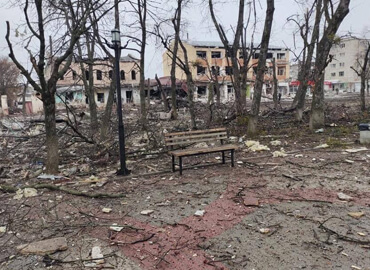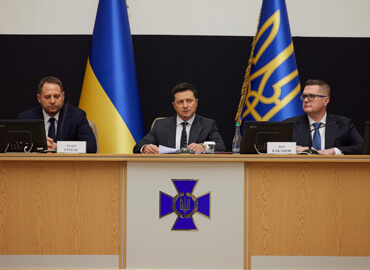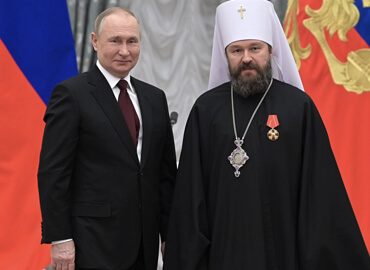On the evening of February 21, there were reports that Russian leader Vladimir Putin signed decrees «On the recognition of the Donetsk People’s Republic» and «On the recognition of the Lugansk People’s Republic.» At the same time, he addressed his compatriots, but his lengthy speech was also addressed to Ukrainians. As a justification for such a step, he offered his fellow citizens a tour of his vision of history, which included the giving away of «Russian lands» by Vladimir Lenin and Nikita Khrushchev to Ukraine «with the population of historical Russia.» Calling Lenin the «author and architect» of Soviet Ukraine, Putin accused him of needlessly indulging «independents and nationalists» at a time when the foundations of the future USSR were being laid. According to him, it was the hard line of the «leader of the world proletariat» and his directives that led to having the Donbass «literally squeezed into Ukraine.»
Putin’s recognition of the «independence» of the territories occupied by separatists in the east of neighboring Ukraine and his dubious interpretation of historical events caused a wave of criticism and indignation not only among historians. Still, there are countries (Syria, Cuba, Venezuela, Nicaragua), political associations (the Houthi movement in Yemen), as well as unrecognized Abkhazia, South Ossetia, and Transnistria which met the Vladimir Putin’s appeal with thunderous applause and declared their readiness to place the two new states on their political map of the world. It is interesting, however, that even the Russian leadership on Tuesday was «confused by the testimony» and for quite some time could not give a clear answer as to which borders of the two «republics» they recognize – the actual borders or those within the borders of the Luhansk and Donetsk regions, given that significant portions of the regions, which are under Ukrainian control, are laying the groundwork for unleashing a large-scale war with Ukraine. Toward evening, Vladimir Putin dispelled any citizens’ doubts, noting that Russia recognized the DPR and LPR within the «limits established by their constitutions.» It is worth noting that one of the leaders of the LPR in the local “parliament” the same day called for a decision that «will allow for the restoration of the territorial integrity of the LPR.» And Putin at the same time indirectly promised them support, saying that the Kremlin supports the sovereignty of the former Soviet republics, however the situation with Ukraine is an exception «because of the external influence on this country.»
It is noteworthy that the short list of leaders ready to join Russia does not yet include «Russia’s eternal ally» Alexander Lukashenko, although it was previously reported that he would discuss the recognition of the LPR and DPR if that decision was made by Russian President Vladimir Putin:
«Putin and I will agree on what we should do to make things better for Russia and Belarus. But this will be a joint decision… We will provide any support Russia needs, both military and, if necessary, economic. We will share the last piece of bread, just like with those suffering in the Donbass.»
It has long been known that Alexander Lukashenko promises much when he speaks, especially when giving interviews to loyal journalists, because then no one dares ask him a pointed question, which gives him a lot of freedom to play in his one-man theater. But yesterday, when the Kremlin allegedly expected him to make public a major political decision regarding the LDNR, the regime’s mouthpieces remained silent. For example, on Tuesday morning on the pages of the main news agency BelTA there was no information about the recognition of the separatist republics and Lukashenko’s opinion on the matter. At 13:19 Minsk time, a modest report appeared regarding a telephone conversation between the Chief of the General Staff of the Armed Forces of Belarus Viktor Gulevich and the Commander-in-Chief of the Armed Forces of Ukraine Valery Zaluzhny, who discussed «the emerging military-political situation in the region.» Another official resource, Belarus Today (formerly Soviet Belarus), promptly provided information regarding the Kremlin’s recognition of the independence of the LDPR, but subsequently concentrated on covering the «constitutional referendum» in Belarus.
As usual, pro-Lukashenko Telegram channels and bloggers have been more «straightforward» in presenting information. The well-known propagandist Grigory Azarenok published a speech by the Russian Permanent Representative of the UN Vasily Nebenzya, as well as a video by the LPR on the ratification of friendly treaty with Russia. Zheltye slivy started trolling opponents of the authorities, expressing delight that the Belarusian issue has supposedly ceased to exist for the West against the backdrop of Vladimir Putin’s fateful decision and the escalation of the Russian-Ukrainian conflict. This resource covered the situation with the LDNR, reposting publications by the press secretary of the Russian Foreign Ministry Maria Zakharova and the infamous anti-Ukrainian author Anatoly Shariy, among others. Playing along with the separatists, authors expressed the opinion that those parts of the Lugansk and Donetsk regions that are not in the LDPR should be considered «occupied by Ukraine.» However, they remained careful not to call on the Belarusian authorities to recognize the «republics.» Apparently, they were expecting official information from Alexander Lukashenko or his circle.
This information appeared only around 16:00 in the form of a statement by the Belarusian Foreign Ministry, which said that «Belarus respects and understands Russia’s decision to recognize the independence of the Donetsk and Luhansk People’s Republics,» but, unlike their Cuban and Syrian counterparts, Belarusian diplomats (who are controlled completely by Lukashenko) have not yet expressed their readiness to recognize the LPR and DPR, although they prostrated themselves before the Kremlin, saying:
«This step by Russia, from Belarus’s perspective, has not only a political, but also a serious personal, humanitarian dimension, given the number of Russian citizens living in these territories and who have been experiencing hardship for almost eight years.»
In a statement, the Foreign Ministry found the «guilty» party, recalling the «particular responsibility of the U.S. and the European Union in escalating the situation in the region,» calling on the West to «stop provoking violence, pushing troops and weapons into Ukraine and the Baltic countries, and imposing illegal sanctions.»
Having received a clear signal about the «master’s» position, the «heavyweights» entered the stage. Accompanied by the Foreign Ministry, pro-government political scientist Alexander Shpakovsky said that in Belarus «there is no need to speed up this process,» since first the issue with Crimea needs to be brought to its logical conclusion. He also suggested that Lukashenko visit the peninsulas in early April, as this «could be linked to the Day of Unity of the Peoples of Russia and Belarus.» At the same time, he leaves himself room for maneuvering, noting that from the recognition of the LDPR it will also be “neither hot nor cold,” because Minsk has no moral obligations to Kyiv, and Belarus will lose the Ukrainian market sooner or later anyway. In addition, Shpakovsky gives a warning that looks more like a serious threat:
«And all those screaming should remember that it is in the southern regions of our country that a large Russian military group is deployed, which, together with the Belarusian army, is an impressive force and is blocking Kyiv from transferring troops from the north of Ukraine to Donbass.»
In another marker of the regime’s mood, the young ONT staff member Igor Tur, who earned Alexander Lukashenko’s special sympathy after a series of “journalistic investigations” slandering protesters and dissidents, received in personal messages a «flurry of questions» about the position of the Belarusian authorities regarding the independence of the LDNR and assured those interested that «Lukashenko and Putin have probably discussed this and have developed a single Union strategy.» However, late on Tuesday evening, Tur, like Shpakovsky, admitted that now is «an inconvenient time,» and referred not to the Crimean factor, but to… the holding of the referendum in Belarus:
«I would not want people to vote for or against the new Constitution, based on whether Lukashenko recognized the DPR and LPR. There is a high likelihood of this subject influencing citizens. This is wrong, of course, on the part of the citizens, but I see it directly. I’m still for prioritizing an internal agenda. Let’s deal with the Constitution, and then immediately see to the Donbass.»
According to information from open sources, the Belarusian authorities have not yet taken their place in the queue of countries ready to recognize the independence of the two quasi-entities in the Donbass. Perhaps Igor Tur is right, and Lukashenko and Putin already have certain agreements on this matter, with only the details of the deal, including the date it takes effect and the price that Lukashenko demanded, not yet disclosed to the public. It is also possible that the Belarusian dictator, given that his regime has deteriorated significantly after the brutal crackdown on protests in 2020, is still at the stage of bargaining with Vladimir Putin and still has something to offer in return for various kinds of support, including financial (e.g., the status of Crimea, the independence of the LDPR, and the official deployment of Russian bases, as opposed to just «training centers»). If the two rulers come to a consensus on this issue, we will find out about it very soon, because in this case the dependent Belarusian Foreign Ministry will no longer hesitate to make a corresponding statement, but not about «respect and understanding,» but on «recognition.»
Материал доступен на русском языке: Признавать, не признавая. Игра в ромашку от Лукашенко



